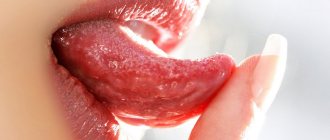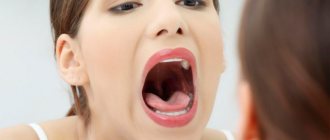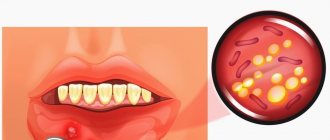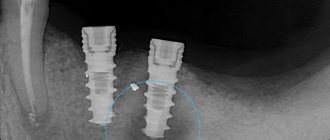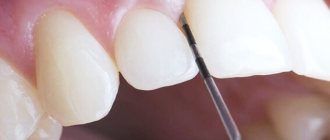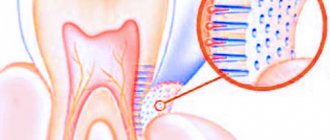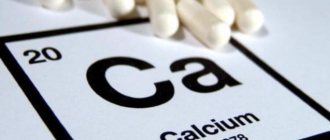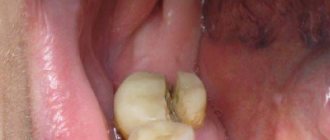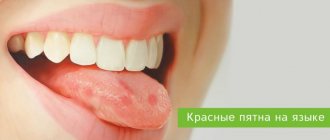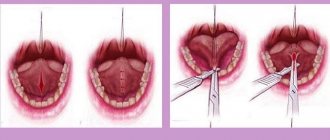What is the palate and where is it located in the oral cavity?
As mentioned above, this is a horizontally located partition that separates the oral cavity from the nasal cavity. Approximately 2/3 of its surface suggests the presence of a bone base. These are solid processes in the form of plates that have a concave shape and are located in a horizontal position on the upper jaw. They are covered by a thin mucous membrane, which turns into the velum palatine. This is already a muscular formation with a fibrous membrane, also covered with mucous membrane.
The upper palate is the wall located in the mouth from above in the horizontal plane
It is the soft part that represents the barrier between the mouth and pharynx, and on its far edge there is the uvula. The palate is directly involved in the process of chewing food and swallowing, helps in the reproduction of sounds, which makes it an important component of the articulatory apparatus.
What to do to prevent headaches during a hangover
If a person is going to participate in an event where alcohol is consumed, they can protect themselves from a subsequent hangover by taking the following measures:
- Make a psychological attitude. If a person decides in advance not to get drunk, no amount of beer or other alcohol can knock them out of the saddle;
- Do not smoke while drinking;
- Half an hour to an hour before the event, eat well, be sure to eat a fatty product, such as butter. It neutralizes alcohol;
- Do not drink alcohol in one gulp at short intervals. “The quieter you drive, the more sober (healthier) you will be”;
- Do not mix different types of alcohol, especially beer, champagne with vodka, whiskey, brandy.
A hangover doesn't cause headaches for those who know how to drink. What this means, no one fully knows. How much can a person drink without suffering from a hangover? He will answer this question only through experience.
Causes and symptoms of inflammation
At the initial stage of the pathological process, primary inflammation is diagnosed. First, blood circulation in the tissues is disrupted, and the person begins to experience moderate discomfort or even pain, which is especially noticeable when touching the palate with the tongue. Slight swelling appears. When the problem enters the stage of secondary inflammation, the pathological process takes over more space, and the pain noticeably intensifies. When the upper palate hurts, there can be a variety of reasons. Let us consider the main prerequisites in more detail.
Infections in the mouth
Infections of a bacterial and fungal nature (candidiasis) can provoke inflammatory processes, including on the mucous membrane of the palate. With this clinical picture, a whitish coating usually appears, painful ulcers, red areas and swelling may appear. If the problem is not addressed in time, the burning and pain will intensify, which will subsequently create serious difficulties in chewing food and swallowing.
The photo shows candidiasis in the mouth
Mechanical, thermal and chemical injuries to the mucous membrane
The palate is easily scratched by hard foods, such as seed shells or crackers. The problem may also be the appearance of a thermal or chemical burn after eating too hot food/drinks or sour, salty, spicy foods. Such microtraumas in conditions of insufficient hygiene become a favorable aid for the formation of pathogenic microflora and infection of tissues. The result will be redness and soreness. The mucous membrane usually swells, ulcers and blisters appear.
Dental diseases
Pathologies such as caries, pulpitis and stomatitis can also lead to the appearance of painful ulcers on the palate and along the entire perimeter of the mucous membrane. The inflammatory process often spreads to the surrounding soft tissues, including the palate and tongue, causing corresponding complications. A similar clinical picture also occurs with severe periodontitis or periodontal disease.
Another possible problem is leukoplakia, the development of which is accompanied by the formation of compactions in the mucous membrane and the appearance of dense whitish plaques, which can also be localized in the palate. The cause of this pathological phenomenon may be trauma, frequent rough mechanical impact on the mucous membrane, excessive smoking and consumption of low-quality alcohol.
The photo shows leukoplakia
Other Possible Prerequisites
In some cases, symptoms of inflammation appear after the installation of metal crowns or braces. Here, the appearance of redness, itching, and swelling can be provoked by the influence of galvanic currents and a corresponding change in the natural environment in the oral cavity. The reason why the soft palate in the mouth hurts may be associated with infectious diseases of the ENT organs.
It should also be noted that adult heavy smokers and those who abuse low-quality alcohol are especially susceptible to frequent dental problems. It also happens that inflammation of the palate is caused by disturbances in the functioning of the submandibular, sublingual and minor salivary glands. Sometimes, as a result of such disorders, various neoplasms arise in the oral cavity - from small benign to serious malignant tumors, including fibromas, papillomas, lymphangiomas and other painful phenomena. In any case, if you suspect a problem, you should definitely contact a specialist.
Diseases of the ENT organs can cause this symptom
Prevention of palate diseases
It is easier to prevent inflammation of the palate than to cure its advanced stage. To do this you need to do the following:
- Limit the intake of solid foods - crackers, caramel, chips, lollipops, cookies. They can accidentally scratch the oral mucosa.
- Wash vegetables and fruits thoroughly. By consuming dirty foods, you can introduce infection into wounds and scratches on the oral mucosa, which can lead to the development of inflammation.
- Eliminate excessively cold and hot foods from your diet so that they do not burn the soft tissues in your mouth. This rule must be followed if the palate is already inflamed.
- Stop drinking sweet soda, as it irritates the oral mucosa. Strong alcohol has the same effect.
- Brush your teeth regularly. Brushing your teeth twice a day will not only protect against caries, but also prevent bleeding gums and the appearance of swelling near the uvula. You should also rinse your mouth after every meal, especially if your palate is already swollen.
- Constantly strengthen your immune system. You need to exercise, eat natural foods, plan your diet wisely, ensure regular good sleep and monitor the replenishment of vitamins and microelements.
- Treat your teeth regularly. To make your teeth strong, it is not enough to brush them daily and eat right. In addition, you should visit the dentist 2 times a year to undergo preventive examinations, remove tartar and plaque, and promptly treat caries and gingivitis (gum inflammation).
- Consult a doctor for any symptoms of dental diseases and pathologies of the ENT organs: if the throat turns red, the tonsils become swollen, signs of inflammation begin to be felt, wounds, ulcers and swelling appear in the mouth, and pain occurs in the palate.
- Monitor the condition of children's teeth. This rule applies to parents. It is worth explaining to your child that you should not put your hands or dirty objects in your mouth. Explain why exactly you shouldn’t do this.
Every person should take care of their oral health. Maintaining immunity, proper nutrition, good hygiene and timely visits to the dentist will help completely eliminate the risk of developing diseases of the palate and the appearance of pain in this area. If the inflammatory process has already begun, you should urgently consult a doctor and follow all his treatment recommendations.
Knowing and following some rules will help avoid damage and further development of diseases:
- Avoid eating foods that are too hot or cold.
- Stop using chewing tobacco, smoking, and excess alcohol. When you smoke, thousands of tiny irritants enter your mouth, damaging sensitive mucosal tissues.
- Control your stress level, as it often causes wounds and ulcers.
- You should rinse your mouth with cool salt water every morning.
- If you are sick, use tinctures based on aloe vera, which promote rapid healing of wounds and prevent bacteria from multiplying.
- Take more vitamin B, which promotes rapid healing and prevents the development of microbes around the lips and in the mouth.
The nature of the pain and the need to contact a specialist
If the roof of your mouth hurts, the nature of the course of this symptom usually depends on the cause that led to the inflammatory process. To understand what exactly caused this reaction, you will have to seek medical help. If this is simple damage from rough food, the wound may swell for several days, but the sensations will be tolerable, and the discomfort should gradually subside.
To speed up the healing process, experts recommend being careful when eating and rinsing your mouth with a light antiseptic solution or a soothing herbal infusion. You should consult your doctor personally about suitable medications for symptomatic therapy.
If the pain does not go away within 3-4 days and only gets worse, you should definitely visit a dentist. If the situation is ambiguous, the specialist will suggest undergoing a diagnostic examination. To determine the cause of the pathological process, you may have to undergo x-ray diagnostics, as well as visit other specialized doctors, for example, an ENT specialist, an infectious disease specialist, a therapist or an oncologist.
How to treat?
When the palate hurts, treatment should not just eliminate the symptoms, but also fight the very cause of the pathology. That is why before starting therapy, it is necessary to establish an accurate diagnosis. To do this, it is recommended to visit a doctor and, if necessary, undergo tests and take an x-ray.
Immediately after diagnosis, the specialist prescribes treatment:
- If we are talking about an infectious lesion of the mucous membrane, then it is advisable to use antibacterial drugs. They are also prescribed for mechanical injuries. Typically, such medications are produced in the form of a solution or spray. We are talking about medications such as Miramistin, Dekasan, Rotokan, Chlorhexidine. Herbal decoctions can also serve as an antiseptic: chamomile, bark, oak, sage.
- When your palate hurts due to candidiasis, you should seek help from antifungal agents. Moreover, the doctor usually prescribes both a systemic drug in the form of tablets and an external gel.
- Neurological pathologies and inflammation in the temporomandibular joint are treated with antibiotics, physiotherapy, and special compresses.
- In case of a thermal burn, you should rinse your mouth with warm water as soon as possible. To prevent infection, you can also use Metrogyl gel. If we are talking about a chemical burn, then you cannot self-medicate and hesitate. In this case, it is necessary to urgently call an ambulance.
How is differential diagnosis performed?
As mentioned above, if the doctor has doubts about the cause of the symptoms, the patient will have to undergo a differential diagnosis. It is necessary to make a correct diagnosis, excluding all other pathologies with similar symptoms. As part of such a survey, the following activities may be required:
- visual examination and medical history,
- x-ray examination,
- general blood tests and allergy tests,
- consultation of specialized specialists,
- full examination of the body, including ultrasound and CT.
For diagnosis, it is necessary to undergo tests.
But such in-depth diagnostics are not needed in all cases. If the clinical picture is obvious, the doctor will not require additional procedures. However, it is very important to establish an accurate diagnosis, because the further course of treatment will directly depend on it.
Calcium deficiency as a cause of numbness in the mouth
Hypocalcemia is the medical term for low calcium levels. This condition can cause numbness around the mouth. Other symptoms may include seizures, muscle spasms.
Hypocalcemia can result from the following reasons:
- low vitamin D levels
- thyroid diseases
- some congenital disorders
Treatment
To treat hypocalcemia, your doctor will first need to determine the cause. They may then offer one of the following options:
- calcium supplement
- vitamin D supplement
What to do if your palate hurts. Treatment methods
First of all, it is necessary to treat exactly what served as the impetus for the development of the pathological process. As part of supportive symptomatic therapy, special solutions for oral baths and mouth rinses are usually prescribed. These may be antibacterial, anti-inflammatory or antifungal agents, depending on the nature of the problem.
Gels and ointments are also often prescribed for external use, with a similar therapeutic effect or, for example, antihistamine action, if swelling, redness and itching are an allergic reaction. If a serious infection occurs, your doctor may prescribe antibiotics. It is important to remember that only a professional doctor can select adequate treatment in your particular case.
Various gels may be prescribed for treatment
Multiple sclerosis as a cause of numbness in the mouth
Multiple sclerosis (MS) is a chronic disease that affects the central nervous system. In multiple sclerosis, the myelin sheath that surrounds and protects nerve cells degrades. This can cause problems with sensation.
A feeling of numbness or pins and needles is a common symptom of MS.
Treatment
According to the National Multiple Sclerosis Society, there are currently no treatments available to relieve the numbness or tingling associated with MS, however, they add that these sensations usually come and go, and your doctor may prescribe a short course of corticosteroids to speed recovery.
What drugs are used in different clinical cases
The choice of treatment must be justified by the cause of the problem. So, all the drugs that are prescribed if the palate is inflamed or if the gums also hurt can be divided into 3 large groups:
- antifungal: these include broad-spectrum antimycotics that effectively combat the development of candidiasis and trichomonas. They are usually prescribed for trauma to the mucous membrane, for stomatitis and thrush - “Levorin”, “Nystatin”, “Candide”,
- antibacterial: these include antibiotics that specifically prevent the proliferation of bacteria and pathogenic microorganisms. So, for example, “Metronidozole” and “Amoxicillin” can only be prescribed by a doctor, and their help is usually resorted to when there is a serious infection of tissues and an increase in temperature. But antibacterial rinsing solutions are used as maintenance therapy, and these include “Chlorhexidine”, “Stomatofit” and others,
- antiviral - as a rule, used in the early stages of the disease and for preventive purposes, they suppress the reproduction of viruses. Such drugs include “Acyclovir”, “Oxolin”, “Interferon”1.
Drugs can only be prescribed by a doctor.
Any of the above drugs, and especially antibiotics, can only be taken as prescribed by a doctor. Remember, if suspicious symptoms appear, it is better to consult a doctor immediately. The longer you delay visiting a specialist, the higher your chances will be of encountering very serious consequences and complications.
Treatment
There is no perfect medicine for treating oral mucosal sloughs. It is important to treat the underlying cause as soon as you are diagnosed. The dentist will analyze the symptoms and compare them with one of the reasons mentioned above. He will then be able to prescribe medication to treat the detachment of the mucous membrane in your mouth.
The dentist may prescribe a local anesthetic or tablets to help relieve the pain. These medications include aspirin, acetaminophen, and ibuprofen.
Usually, mucosal detachment goes away within a few days, but if it lasts longer for you, then you need to see a dentist as soon as possible. Treating the underlying cause is the key to solving the problem.
Gels and ointments for treating inflamed mucous membranes
External agents, which include gels and ointments, are also prescribed to relieve pain and acute signs of inflammation. Below, as an example, are the most effective and popular drugs from this pharmacological group:
- “Nystatin” ointment - it is prescribed for candidiasis. The active ingredients in the composition destroy fungal cells and create a reliable barrier that prevents the further spread of infection,
- "Levomekol" ointment - has an antibacterial effect and promotes tissue regeneration processes. The active components of the product help reduce inflammation and actively fight the population of harmful microorganisms,
- “Solcoseryl” – this product contains an extract of calf’s blood (dialysate), which has a powerful therapeutic effect. The gel restores oxygen metabolism, triggers tissue regeneration processes at the cellular level and promotes collagen production, thereby accelerating damage processes,
- "Cholisal" is an anesthetic gel with a slight cooling effect. Helps relieve swelling and inflammation, destroys pathogenic microflora.
Gels and ointments are prescribed to relieve pain and acute signs of inflammation.
The choice of a suitable remedy remains at the discretion of the attending physician and directly depends on the cause of the development of the inflammatory process in the palate. Before use, you should carefully read the instructions and then follow all the instructions of the treating specialist.
The main signs of inflammation of the palate
Some symptoms of inflammation can reveal its nature. The color of inflamed tissue can tell a lot. Redness accompanied by enlarged tonsils indicates the presence of tonsillitis. Bubbles filled with clear exudate indicate herpes. Red ulcers covered with a white cheesy coating indicate a fungal infection.
Infectious diseases are almost always accompanied by unpleasant sensations - the palate hurts, swells, bleeds and burns when swallowing. Often, not only the palatine bridge on top swells, but also the tongue, which leads to increased salivation and problems with swallowing. As a result, irritation of the larynx and throat may begin, in which a burning sensation is felt, ulcers appear, pain and swelling occur. It becomes extremely painful to swallow food. Sometimes the gums begin to bleed, and in rare situations the body temperature rises.
Fungal inflammation
Aphthous inflammation
Herpangina
Ulcerative inflammation
Leukoplakia
Tumor
Some causes of inflammation of the palate are quite dangerous, so treatment should begin immediately after diagnosis. Treatment tactics depend on why the mucous membrane lining the upper part of the oral cavity is inflamed.
In case of mild mechanical or thermal damage to the palatal tissues, you can rinse your mouth with a solution of soda and salt or tinctures and decoctions of herbs: chamomile, sage, oak bark. To relieve pain caused by a person burning the oral mucosa while tasting a dish, it is enough to rinse your mouth with cold water or a soda-salt solution.
If the palate is quite inflamed, you should resort to the use of local anti-inflammatory and analgesic medications. To quickly remove pain and itching, you should supplement traditional drug therapy, and also eliminate the risk of infection in small scratches and sores.
If the palate is inflamed due to dental caries or pulpitis, treatment by a dentist will be required. A person will not be able to get rid of the disease until his teeth are treated, since caries is a constant source of infection in the mouth.
Wounds and ulcers formed due to inflammation of the upper palate should be treated with antiseptics, for example, Rotokan, Chlorhexidine or Furacilin. The following drugs fight fungal inflammation:
- Viferon, Pimafucin and Nystatin ointments.
- Clotrimazole cream.
- Nizoral.
- Borax with glycerin.
If the roof of your mouth hurts too much, you can make warm infusions for rinsing with chamomile, propolis, eucalyptus or oak bark at home. But it is better to purchase an anesthetic in the form of a spray at the pharmacy: Hexoral, Lidocaine Asept or Benzocaine. Dental gels such as Cholisal, Lidochlor, Kamistad have mild analgesic properties. Their main function is to relieve inflammation, and their secondary function is anesthesia.
If inflammation of the palate, accompanied by swelling, is caused by viral agents, antiviral medicinal sprays Miramistin, Lugol, as well as Acyclovir ointment are suitable. If the palatal tissues are swollen due to viral stomatitis, you can use folk recipes for medicines that can be easily prepared at home. The main ingredients in them are sea buckthorn and rosehip oils, propolis tincture.
The roof of the mouth hurts (in some cases the reasons can be determined independently) due to various factors; if this is a consequence of an allergic reaction, then it will be enough to take antihistamines. More often than not, you can cope with an irritated palate on your own; the need to visit a doctor rarely arises (for example, when purulent discharge appears).
| Antiviral | Penciclovir, Oxolin, Acyclovir | Prevents viruses from multiplying |
| Antifungal | Candide, Nystatin, Natamycin, Potassium iodide | Prescribed for candidiasis |
| Antibacterial | Megacillin, Ospen, Amoxicillin | Prescribed for high fever, severe symptoms of infections |
Nystatin
Various gels and ointments are used to eliminate irritation on the mucous membrane:
- Levomekol. The main active ingredient in the ointment is chloramphenicol, which dries out inflammation and resists infections.
- Nystatin ointment. Used as a disinfectant.
- Holisal. Its cooling effect relieves irritation, reduces swelling, and resists inflammation.
- Solcoseryl. Regenerates tissue, helps produce collagen, heals wounds.
They help well in the treatment of rinsing with:
- Chlorhexedine;
- Chlorophyllipta;
- Stomatophyta;
- Furacilina.
Traditional methods
Home remedies based on herbal preparations and plants are very helpful in healing an irritated palate. You can use calendula-based tinctures: water-based, alcohol-based, or independently brewed as tea. Such decoctions are used during the acute phase, every 2–3 hours during the day. Rinse inflamed areas and throat with alcohol and water solutions.
Traditional methods
Other methods
The roof of the mouth hurts (the causes have been identified and eliminated) from a burn from hot food, which means you can reduce it by applying ice to the upper part of the oral cavity.
Other methods also help:
- The cooling effect of yogurt is beneficial in treating pain in the mouth area. For example, after eating spicy food, two or three tablespoons of yogurt significantly reduce pain. Yogurt is also helpful in cases of yeast infection or oral thrush.
- Using baking soda is also an effective natural home remedy for treating ulcers on the upper palate. To do this, mix 1 tsp. baking soda with a little water to form a thick paste. Apply it to the affected surface 3 times a day. Baking soda quickly relieves pain and burning sensation, and healing occurs within 2-3 days.
- Honey is a good remedy for healing wounds and burns. It reduces inflammation and has an antibacterial effect.
- Witch hazel helps well against stomatitis as a mouthwash.
- It is necessary to add foods containing vitamins C and B to the diet, as they promote rapid healing of ulcers.
- Avoid large amounts of salt in food because it can increase pain and make it worse.
- Stick to a simple bland diet for a few days to help you recover faster.
- Avoid hot tea, coffee, cola and hard foods.
A Brief Overview of Mouthwashes
Pharmacy rinses help relieve acute signs of inflammation, relieve pain and reduce swelling. Among the most effective drugs in this category, experts identify the following medications:
- Chlorhexidine is an inexpensive antimicrobial agent that helps to significantly reduce inflammation and stop the spread of infection. It is recommended to use for rinsing no more than 3 times a day,
- “Stomatofit” is a herbal remedy that helps with gingivitis and periodontitis,
- "Furacilin" - prescribed for inflammatory processes in the throat, palate and oral cavity. Has a pronounced antimicrobial effect and ensures the destruction of pathogenic microflora,
- “Chlorophyllipt” - a composition based on eucalyptus helps to soothe an irritated throat and palate during colds.
Pharmacy rinses help relieve acute signs of inflammation
“For some reason, my palate gets irritated about once every six months. I don't know, maybe it's too sensitive. And it happens that the pain is simply unbearable, you have to swallow painkillers. But in such cases, I usually rinse my mouth with chlorhexidine and after a week everything goes away completely.”
MariaS., from correspondence on the forum www.32top.ru
You should start using any of the drugs described above only after consulting a specialist. First, you should visit your dentist and determine the exact cause of the inflammation.
Factors influencing the condition of the oral mucosa
- Having bad habits (smoking, alcoholism)
- Hormonal imbalances
- General dehydration
- Weakened immunity, AIDS, HIV infection
- Inflammatory processes of gums and teeth
- Genetic predisposition
- Vitamin deficiencies
- Exposure to sudden temperature changes
- Presence of infections or inflammatory processes
- Unbalanced diet
- Taking antibiotics and potent drugs without medical supervision
- Damage to internal organs or systems, their dysfunction
The healthy oral cavity of adults contains opportunistic microorganisms that, under the influence of unfavorable factors, can cause viral, infectious, lichen, inflammatory and fungal diseases of the mucous membrane, as well as dysbacteriosis.
What does traditional medicine offer?
Some remedies prepared from herbal ingredients based on folk recipes also help relieve inflammation and reduce pain in the palate. Tannins and astringents in their composition have a disinfectant and analgesic effect. The most popular and proven recipes are described below, but it is better to first discuss their use with your doctor.
Calendula tincture
Used for pharyngitis, laryngitis, tonsillitis and fungal infections in the oral cavity. To prepare the tincture, you can dissolve a teaspoon of the product in 200 ml of warm water. Or pour raw calendula flowers with a tablespoon of boiling water, strain and use for rinsing while warm.
Calendula tincture will relieve pain
Chamomile decoction
Soothes, relieves acute inflammation, helps with colds and fungal infections. A tablespoon of dried flowers is brewed in 200 ml of boiling water, allowed to cool, filtered and used for rinsing 3-4 times a day.
Chamomile decoction helps well in treatment
Sage based rinse solution
Recommended for laryngitis, as well as for scratches on the palate, pharynx or larynx. The solution perfectly relieves inflammation and relieves pain. Sage leaves and flowers (1-2 tablespoons) are brewed in 200 ml of boiled water. The product is infused until it cools completely, then filtered and then used for rinsing up to 6-7 times a day.
Oak bark decoction
Effectively relieves bleeding and inflammation, eliminates swelling. To prepare the solution, 2 tablespoons of crushed oak bark are diluted in 200 ml of water and heated in a water bath for 15-20 minutes. Remove, leave to brew for an hour, filter and then use for rinsing 4-5 times a day.
Gargling with a decoction of oak bark will help in treatment
Honey with tea or milk
Honey has an enveloping and soothing effect and effectively fights the proliferation of fungi and the spread of infection. To enhance the healing effects, it is recommended to eat honey with a warm drink or dilute it in tea.
You can relieve pain in the palate and reduce inflammation with the help of a medicinal mixture, for the preparation of which butter and honey should be mixed in equal proportions. The composition must cool completely, after which it can be taken 0.5-1 teaspoon 5-7 times a day.
Tea with honey is used to treat throat
Diabetes as a cause of numbness in the mouth
Diabetes is a chronic metabolic condition that requires a person to carefully monitor their blood glucose (sugar) levels.
People with diabetes may experience a condition called hypoglycemia, in which blood glucose levels drop too low. This may cause numbness or tingling of the lips or tongue. Other possible symptoms of hypoglycemia include:
- anxiety
- trembling
- headache
- poor concentration
- strange behavior
- disturbance of consciousness
Treatment
Treatment for diabetes depends in part on the type of diabetes a person has. People with type 1 diabetes will need insulin injections to help control their blood glucose levels.
People with type 2 diabetes may also need insulin or other medications to control their blood glucose levels. However, some can manage their blood glucose levels through diet and exercise.
Possible complications
Severe consequences of the pathological process are possible if you ignore obvious symptoms for too long and do not consult a specialist in time. The following manifestations become frequent accompaniments of inflammation of the palate mucosa:
- increased salivation,
- further spread of the lesion,
- the appearance of bad breath,
- bleeding gums,
- purulent processes.
In severe cases, the body temperature rises and there is a real risk of developing sepsis, that is, a general infection of the body. Such dangerous complications can result from tonsillitis, stomatitis, candidiasis or any other dental disease.
Therefore, if you experience pain in the oral cavity, you should immediately see a specialist. If it is a simple wound, the doctor will recommend suitable disinfectant, anti-inflammatory and wound-healing rinse solutions. If the reason is not so obvious, you will have to undergo a full examination and receive direct recommendations from a specialist.
1Lukinykh L.M. Diseases of the oral mucosa, 2000.
Stomatitis
The disease is more often diagnosed in young children and in people with weakened immune systems.
The development of stomatitis (thrush) occurs due to the activity of an opportunistic fungus of the genus Candida. Increased growth of fungal colonies can be provoked by:
- frequent microtraumas of the palate and oral cavity;
- lack of treatment for diseased teeth;
- severe illnesses that weaken the immune defense;
- long course of antibiotic therapy.
Failure to maintain personal hygiene and lack of regular oral care increases the risk of developing thrush.
With stomatitis, not only pain in the mouth on the palate, painful discomfort is noted in the tongue and gums. If you go to the mirror and open your mouth, you can see:
- loose whitish-gray coating;
- small sores.
If you try to separate the whitish film, then after removal there remains a bubble with cloudy contents or eroded mucous membrane.
With severe stomatitis, people complain that the palate and throat hurt greatly when swallowing, and it is difficult to drink even warm liquids. Severe fungal infections are accompanied by hyperthermia, weakness and headache.
Therapy is selected taking into account the severity of the fungal infection:
- Mild when the rash and plaque are moderate, and the pain in the palate and throat does not cause significant discomfort. Patients are prescribed external use of mouth gels and rinsing with solutions. Regular oral hygiene and oral hygiene can quickly eliminate the signs of thrush.
- Severe, in which, in addition to plaque, ulcers form in the mouth and signs of general intoxication appear. In case of severe stomatitis, in addition to external treatment, antifungal agents are prescribed. To eliminate concomitant symptoms, antipyretic and painkillers are recommended.
Vitamins are prescribed to strengthen the immune system.
In addition to the main treatment, patients are recommended to remove or treat diseased teeth. This can be done after the acute manifestations of stomatitis have subsided.
